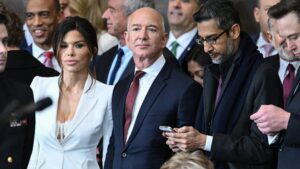Jeff Bezos’ Bold Editorial Shift at The Washington Post: A New Era or a Misstep?
In an unexpected move that has generated considerable buzz within the media landscape, Jeff Bezos, the founder of Amazon and owner of The Washington Post, recently announced a significant change to the newspaper’s editorial direction. This transformation is capturing attention not just for its potential impact on The Post, but also for the implications it holds for the broader media industry and public discourse.
During an all-staff email shared on social media platform X, Bezos articulated his vision for The Post’s opinion pages, stating they would support "personal liberties and free markets" while excluding opposing viewpoints. "We’ll cover other topics too, of course," he noted, "but viewpoints opposing those pillars will be left to be published by others." This declaration marks a calling card to a more ideologically consistent opinion section—a pivot that some embrace, while others vehemently oppose.
Navigating the Reaction: Praise, Condemnation, and Staff Exodus
As expected with such a polarized subject, reactions have varied significantly. Praise has come from supporters within Trump’s administration, including notable figures like Elon Musk, who applauded the decision on social media. Yet, the announcement has led to a wave of dissent within the ranks of The Post itself; former editor Marty Baron voiced his disgust, while editorial page editor David Shipley resigned in protest.
The immediate aftermath of this policy has reportedly led to at least 250,000 cancellations of subscriptions, emphasizing the risks associated with tangling editorial independence with corporate philosophies—a trend that has corporate media watchers concerned.
A Strategic Move Amidst Political Headwinds
Bezos’s timing seems intentional, quelling speculation about favor-seeking loyalties to former President Donald Trump, who has for years criticized The Post as "Fake News." As the nation stands on the brink of the 2024 presidential election, where the stakes are incredibly high, his decision not to endorse either candidate this year deviates from past precedents and raises eyebrows about his motives.
As he and Trump shared a public space during the latter’s inauguration, observers note how Bezos is strategically positioning The Post to cater more to free-market rhetoric, framing his paper as a voice for what he perceives to be underserved perspectives in the marketplace of ideas.
The Broader Implications for Journalism
While Bezos’ directive to shape the newspaper’s editorial stance reflects a growing trend of media consolidation and ideological alignment, experts are voicing concerns that such moves may undermine the foundational principles of journalistic integrity and independence. The clashing perspectives within The Post staff illustrate a deep rift between traditional journalistic values and contemporary corporate strategies.
New York University journalism professor Adam Penenberg notes that while external influences on newspaper editorial policies are not new, Bezos’ explicit mandate to restrict dissenting opinions marks a significant and troubling shift. “There’s a fine line between guiding an editorial direction and stifling dissent," Penenberg commented in a recent analysis.
Should Readers Be Concerned?
For readers, questions loom large: Will this policed editorial direction hinder the diversity of ideas that has always been the backbone of any credible journalism? The essence of a free press is not merely providing a platform for consensus but fostering a rich dialogue that includes conflicting viewpoints.
At Extreme Investor Network, we recognize that in navigating media landscapes, maintaining independent thought is crucial. Our commitment transcends traditional business news, focusing on empowering readers with balanced perspectives on economic and investment landscapes.
The Road Ahead
The question remains whether this move will indeed fill the purported void Bezos aims to address or alienate readers who value multifaceted narratives. As we analyze these developments, we invite you to join us in discussions around the evolving nature of media and the crucial role it plays in shaping our collective understanding of economics, politics, and our lives. At Extreme Investor Network, we’ll continue to provide insights that prioritize depth, diversity, and the unfiltered exchange of ideas—a stark contrast to the emerging narrative strategies of our time.
Stay tuned as we unravel the implications of these shifts in journalism and explore what it means for investors navigating a complex landscape!

